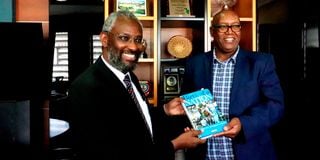Premium
Kiama: Running the UoN not for the faint-hearted

The University of Nairobi VC Stephen Kiama with Nation Media Group CEO Stephen Gitagama at the Nation Centre on June 21, 2022.
The nightmare of running a public university under the current funding crisis has been captured in a heart-rending narration of a VC.
University of Nairobi Vice-Chancellor Stephen Kiama has spoken of his tribulations as he runs the institution that is wobbling in a financial hole, first caused by the Education Ministry’s decision to slash Sh1 billion off its allocation about four years ago.
Just days to the publishing of the much-anticipated recommendations of the Presidential Working Party on Education Reforms that could cause a shake-up of the institutions, Prof Kiama says his early days as VC drove him to the brink of quitting.
Narrating his experiences to 500 participants at a recent universities conference – including Higher Education and Research Principal Secretary Beatrice Muganda Inyangala in Mombasa – Prof Kiama described his stewardship as that of fighting one crisis after another
“As soon as I got an opportunity to run the university, I realised we were doing a lot of fire-fighting,” he said.
“At one time, Kenya Power is disconnecting electricity because you cannot settle the bills, county government officials are in our compound disconnecting water in the student hostels.”
“Before you settle, there are auctioneers who are coming to collect items,” Prof Kiama told an attentive audience, in a speech that opened the door for a floodgate of tales from other university bosses.
The VCs were at the first Biennial Universities Funding Conference 2023.
“Then I realised this thing (crisis) is getting serious. We have accumulated like Sh100 million in unpaid arrears in a year,” he said.
So dire was the situation that Prof Kiama resorted to internal university borrowing, including getting money from workers.
Borrow
Within no time, his decision to borrow from UoN employees was brought to question by watchdogs.
“I realised it was a big problem as the university would look corrupt in my hands,” he said.
Prof Kiama then thought of two options.
“One was to leave the VC position because the university didn’t belong to me. The other was to take action and resuscitate the situation,” he said.
He talked of pressure from all corners. No institution or individual was willing to give money to remedy the situation.
“I said we were not going to borrow externally or internally,” he told the gathering.
Prof Kiama added that he resorted to eliminate middlemen in the payment chain and turned to technology.
“We now pay bills through computer directly,” he said.
The UoN vice-chancellor banned cheques and cash as part of his cost-cutting measures.
He also shut UoN campuses around the country.
“Some governors were quarrelling me over decision to close the campuses but I told them I didn’t have money,” he said.
The university also encouraged online teaching instead of lecturers travelling to far-flung campuses.
On advertisements, Prof Kiama turned to social media, which helped to cut the annual budget from Sh80 million to Sh4 million.
“You don’t find us in the newspapers or TV, these days” he said.
“We said we are not going to buy those (media) spaces and airtime because our students are on social media. Students don’t buy newspapers.”
The university sought to increase accommodation, admission and tuition fees.
Technical University Vice-Chancellor, Francis Aduol, said local public institutions are steeped in terrible financial crises that threaten their quality of teaching and research.
Public universities
Prof Kiama said it is a near miracle that public universities are still producing competent graduates in the face of the shoe-lace budgets to run programmes.
Outgoing Kisii University VC, John Akama, said public universities are on their deathbeds unless measures are taken to pull them from the financial mess.
“When a university begins paying just 50 per cent of staff salaries, know that the institution is dying. If I had the power, I would restructure public universities,” Prof Akama told the audience.
He suggested that the number of public universities be reduced from 37 and to seven.
“Having too many universities has led to a decline in standards of training. We may be producing half-baked graduates,” he said.
Embu University chief, Daniel Mugendi Njiru, said the pending bills at the universities, which stood at Sh60.6 billion by February, are rising sharply ever month.
He added that the amount the government has not remitted to universities for the differentiated unit costs has shot to Sh160 billion.
“If this amount is released to universities, we will solve our problems,” Prof Mugendi said.




